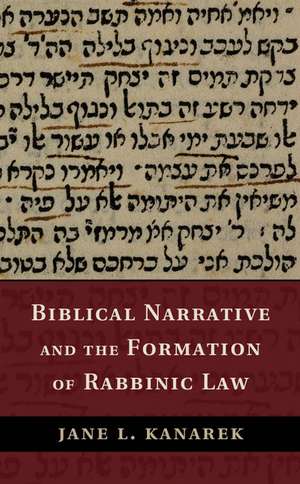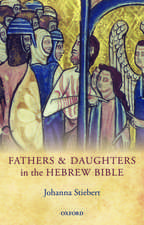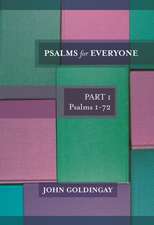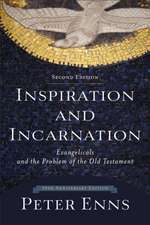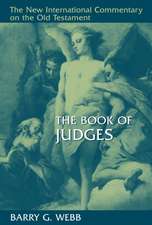Biblical Narrative and the Formation of Rabbinic Law
Autor Jane L. Kanareken Limba Engleză Hardback – 30 iul 2014
Preț: 690.95 lei
Preț vechi: 776.35 lei
-11% Nou
Puncte Express: 1036
Preț estimativ în valută:
132.23€ • 137.54$ • 109.16£
132.23€ • 137.54$ • 109.16£
Carte tipărită la comandă
Livrare economică 14-28 aprilie
Preluare comenzi: 021 569.72.76
Specificații
ISBN-13: 9781107047815
ISBN-10: 1107047811
Pagini: 226
Ilustrații: 1 table
Dimensiuni: 144 x 222 x 18 mm
Greutate: 0.44 kg
Ediția:New.
Editura: Cambridge University Press
Colecția Cambridge University Press
Locul publicării:New York, United States
ISBN-10: 1107047811
Pagini: 226
Ilustrații: 1 table
Dimensiuni: 144 x 222 x 18 mm
Greutate: 0.44 kg
Ediția:New.
Editura: Cambridge University Press
Colecția Cambridge University Press
Locul publicării:New York, United States
Cuprins
1. Introduction; 2. He took the knife: the binding of Isaac as ritual resource; 3. The paradigmatic virgin: Rebekah's marriage and exegetical choice; 4. Avoiding the obvious: Joseph's disappearance and the creation of legal meaning; 5. Textual fragmentation and an assembly of ten; 6. Conclusion.
Recenzii
'This book is a valuable contribution to our understanding of the rabbis as legal readers of the Bible. Kanarek's masterful and astute analysis of the ways in which the rabbis derived laws from the stories of Genesis lucidly demonstrates the intertwined relationship between law and narrative. She sheds light on how narrative gives meaning and authority to law, and at the same time how law is a meaning-making enterprise.' Carol Bakhos, University of California, Los Angeles
'Jane Kanarek has produced an excellent treatment of the dynamic relationship between law and narrative, exemplified through the creative interplay of Scripture and Rabbinic exegesis. This is a model analysis - of much value to all students of this vital cultural phenomenon.' Michael Fishbane, Nathan Cummings Distinguished Service Professor, University of Chicago
'Jane L. Kanarek's book is timely and important. Starting with some known paths in contemporary rabbinic scholarship - the rabbinic use of biblical material, rabbinic law and narrative, and contemporary legal theory - Kanarek blazes a new trail. She masterfully shows how rabbinic exegesis creates a larger 'referential web' of meaning by linking biblical verses and passages that appear unconnected. These referential webs are key to integrating law into biblical narratives. Kanarek's analyses of these referential webs enrich our understanding of how law for the rabbis is about the creation of meaning, and the book newly illuminates the relationship among rabbinic law, narrative, and scriptural exegesis.' Alyssa M. Gray, Emily S. and Rabbi Bernard H. Mehlman Chair in Rabbinics, Hebrew Union College
'That the narratives of the Hebrew Bible gave rise to later rabbinic law seems counterintuitive. Yet through close reading and painstaking exegesis of the book of Genesis and the subsequent literature of the rabbis, Jane Kanarek provides keen new insights into the rabbis' midrashic legal traditions. She demonstrates the manifold ways in which the rabbis' legal traditions shed light on their reading of biblical narrative. Kanarek also limns the distinctions between the Palestinian and Babylonian rabbinic approaches to the relationship of their law to the stories of scripture. She sets rabbinic halakhah within the broader arena of studies on Nomos and Narrative. As Kanarek so astutely observes, 'through rabbinic reading, all of scripture - including narrative scripture - becomes a potential resource for rabbinic law'. A bravura performance.' Rabbi Burton L. Visotzky, Appleman Professor of Midrash and Interreligious Studies, Jewish Theological Seminary
'Kanarek's work it important to any student of rabbinic literature and Judaism, as it approach the heart of Jewish tradition. Her examination of the interplay between rabbinic law and biblical narrative comprises a wonderfully succinct argument that assists the reader in recognizing the exegetical approach of Amoraic rabbis.' William Hart Brown, The Biblical Review
'Jane Kanarek has produced an excellent treatment of the dynamic relationship between law and narrative, exemplified through the creative interplay of Scripture and Rabbinic exegesis. This is a model analysis - of much value to all students of this vital cultural phenomenon.' Michael Fishbane, Nathan Cummings Distinguished Service Professor, University of Chicago
'Jane L. Kanarek's book is timely and important. Starting with some known paths in contemporary rabbinic scholarship - the rabbinic use of biblical material, rabbinic law and narrative, and contemporary legal theory - Kanarek blazes a new trail. She masterfully shows how rabbinic exegesis creates a larger 'referential web' of meaning by linking biblical verses and passages that appear unconnected. These referential webs are key to integrating law into biblical narratives. Kanarek's analyses of these referential webs enrich our understanding of how law for the rabbis is about the creation of meaning, and the book newly illuminates the relationship among rabbinic law, narrative, and scriptural exegesis.' Alyssa M. Gray, Emily S. and Rabbi Bernard H. Mehlman Chair in Rabbinics, Hebrew Union College
'That the narratives of the Hebrew Bible gave rise to later rabbinic law seems counterintuitive. Yet through close reading and painstaking exegesis of the book of Genesis and the subsequent literature of the rabbis, Jane Kanarek provides keen new insights into the rabbis' midrashic legal traditions. She demonstrates the manifold ways in which the rabbis' legal traditions shed light on their reading of biblical narrative. Kanarek also limns the distinctions between the Palestinian and Babylonian rabbinic approaches to the relationship of their law to the stories of scripture. She sets rabbinic halakhah within the broader arena of studies on Nomos and Narrative. As Kanarek so astutely observes, 'through rabbinic reading, all of scripture - including narrative scripture - becomes a potential resource for rabbinic law'. A bravura performance.' Rabbi Burton L. Visotzky, Appleman Professor of Midrash and Interreligious Studies, Jewish Theological Seminary
'Kanarek's work it important to any student of rabbinic literature and Judaism, as it approach the heart of Jewish tradition. Her examination of the interplay between rabbinic law and biblical narrative comprises a wonderfully succinct argument that assists the reader in recognizing the exegetical approach of Amoraic rabbis.' William Hart Brown, The Biblical Review
Notă biografică
Descriere
This book presents a new framework for understanding the relationship between biblical narrative and rabbinic law.
